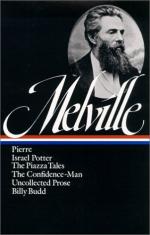At such a juncture, it was hard to maintain a disguise, especially when it involved the seeming rejection of advances like the Sergeant’s. Still, converting his real amazement into affected surprise, Israel, in presence of the sentries, declared to Singles that he (Singles) must labor under some unaccountable delusion; for he (Potter) was no Yankee rebel, thank Heaven, but a true man to his king; in short, an honest Englishman, born in Kent, and now serving his country, and doing what damage he might to her foes, by being first captain of a carronade on board a letter of marque, that moment in the harbor.
For a moment the captive stood astounded, but observing Israel more narrowly, detecting his latent look, and bethinking him of the useless peril he had thoughtlessly caused to a countryman, no doubt unfortunate as himself, Singles took his cue, and pretending sullenly to apologize for his error, put on a disappointed and crest-fallen air. Nevertheless, it was not without much difficulty, and after many supplemental scrutinies and inquisitions from a board of officers before whom he was subsequently brought, that our wanderer was finally permitted to quit the cliff.
This luckless adventure not only nipped in the bud a little scheme he had been revolving, for materially befriending Ethan Allen and his comrades, but resulted in making his further stay at Falmouth perilous in the extreme. And as if this were not enough, next day, while hanging over the side, painting the hull, in trepidation of a visit from the castle soldiers, rumor came to the ship that the man-of-war in the haven purposed impressing one-third of the letter of marque’s crew; though, indeed, the latter vessel was preparing for a second cruise. Being on board a private armed ship, Israel had little dreamed of its liability to the same governmental hardships with the meanest merchantman. But the system of impressment is no respecter either of pity or person.
His mind was soon determined. Unlike his shipmates, braving immediate and lonely hazard, rather than wait for a collective and ultimate one, he cunningly dropped himself overboard the same night, and after the narrowest risk from the muskets of the man-of-war’s sentries (whose gangways he had to pass), succeeded in swimming to shore, where he fell exhausted, but recovering, fled inland, doubly hunted by the thought, that whether as an Englishman, or whether as an American, he would, if caught, be now equally subject to enslavement.
Shortly after the break of day, having gained many miles, he succeeded in ridding himself of his seaman’s clothing, having found some mouldy old rags on the banks of a stagnant pond, nigh a rickety building, which looked like a poorhouse—clothing not improbably, as he surmised, left there on the bank by some pauper suicide. Marvel not that he should with avidity seize these rags; what the suicides abandon, the living hug.




